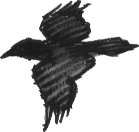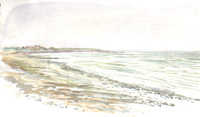 |
Tarn PointThursday 22nd 2001, Cumbria |
![]()
![]()
![]()
![]()
![]()
![]() This Month
Rocks
History
Workshop
Links
Home Page
This Month
Rocks
History
Workshop
Links
Home Page
![]()


TWO RAVENS fly over the windswept foreshore at Tarn Point near Hycemoor, Cumbria. I had set out this morning to explore the dunes at Eskmeals Nature Reserve at the mouth of the Esk, but found the yellow flag flying there; an indication that the reserve is closed because they're testing shells on the adjoining gun range. Tarn Bay is the nearest place with public access immediately south of the range, but even here, as I sketch, I feel the car joggle as I hear several bangs in the distance.
Three Redshank trot breast-deep in water as they work a shallow channel together while three Ringed Plovers stick to the sand at the water's edge.
 There's a brownish bird which, even for a wader, seems somehow out of proportion. It's got legs that seem as long as those of the curlew, but its fairly substantial beak is no longer than that of a lapwing. It's in brownish winter plumage but flashes a conspicuous white rump, edged with black (or dark brown, to be accurate), as it flies. It also has wing bars.
There's a brownish bird which, even for a wader, seems somehow out of proportion. It's got legs that seem as long as those of the curlew, but its fairly substantial beak is no longer than that of a lapwing. It's in brownish winter plumage but flashes a conspicuous white rump, edged with black (or dark brown, to be accurate), as it flies. It also has wing bars.According to my bird book this must be a Grey Plover, a species that winters with us but nests on the tundra during the short Arctic summer.
![]()
Richard Bell,
wildlife illustrator
E-mail; 'richard@willowisland.co.uk'
![]() Next page
Previous page
This day last year
This month
Nature Diary
Home Page
Next page
Previous page
This day last year
This month
Nature Diary
Home Page
![]()